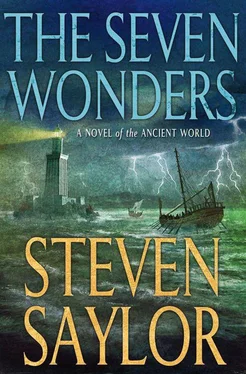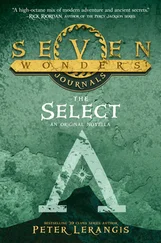Steven Saylor - The Seven Wonders
Здесь есть возможность читать онлайн «Steven Saylor - The Seven Wonders» весь текст электронной книги совершенно бесплатно (целиком полную версию без сокращений). В некоторых случаях можно слушать аудио, скачать через торрент в формате fb2 и присутствует краткое содержание. Год выпуска: 2012, Издательство: Macmillan, Жанр: Исторический детектив, на английском языке. Описание произведения, (предисловие) а так же отзывы посетителей доступны на портале библиотеки ЛибКат.
- Название:The Seven Wonders
- Автор:
- Издательство:Macmillan
- Жанр:
- Год:2012
- ISBN:нет данных
- Рейтинг книги:4 / 5. Голосов: 1
-
Избранное:Добавить в избранное
- Отзывы:
-
Ваша оценка:
- 80
- 1
- 2
- 3
- 4
- 5
The Seven Wonders: краткое содержание, описание и аннотация
Предлагаем к чтению аннотацию, описание, краткое содержание или предисловие (зависит от того, что написал сам автор книги «The Seven Wonders»). Если вы не нашли необходимую информацию о книге — напишите в комментариях, мы постараемся отыскать её.
The Seven Wonders — читать онлайн бесплатно полную книгу (весь текст) целиком
Ниже представлен текст книги, разбитый по страницам. Система сохранения места последней прочитанной страницы, позволяет с удобством читать онлайн бесплатно книгу «The Seven Wonders», без необходимости каждый раз заново искать на чём Вы остановились. Поставьте закладку, и сможете в любой момент перейти на страницу, на которой закончили чтение.
Интервал:
Закладка:
Posidonius cleared his throat “We’ll speak of the matter later.”
Seeing our host wished to change the subject, Antipater turned his attention to the knife in Posidonius’s hand. “Do I understand that this magnificent blade belongs to you, Gatamandix?”
The Druid took the knife and gripped the hilt with a light, familiar touch. “I suppose Posidonius told you how he witnessed a ‘barbaric’ human sacrifice committed with this very knife? I see from your faces that he did. Yes, this is my knife. And yes, I was the Druid who delivered the death blow-like this!” He thrust the knife into empty air.
Antipater and I jumped. The Druid appeared to smile behind his moustache. “Don’t worry. The gods demand no sacrifice today.”
“Where is Cleobulus?” said Posidonius.
“Your student left us at the door and went on to his parents’ house.”
“And Vindovix?” said Posidonius.
“He went straight to his room,” said Gatamandix. “Tired from riding all day. He’s probably asleep.”
Posidonius shook his head. “How that young man stays so fit is a mystery; he seems to do nothing but sleep and eat. But it’s just as well he didn’t come to the garden. Zoticus and Gordianus will be able to-ah, but I’ll say no more, or else I’ll compromise the experiment.”
“An experiment?” said Antipater.
“Yes, in which you and Gordianus will play a central part.”
“You never mentioned this before.”
“Because the time was not yet right. But now we must make haste.”
“Are we leaving the house?” There was a note of complaint in Antipater’s voice.
“We are, indeed. The time has come to visit the Colossus.”
Posidonius saw the excitement on my face, and smiled. My desire was at last to be realized. But what did Posidonius mean when he spoke of an ‘experiment’? He would say no more. I quickly fetched some cloaks, for it was likely to be chilly and windy at the waterfront, then followed our host to the vestibule.
Gatamandix stayed behind in the garden. I glanced over my shoulder and saw the Druid turn the knife this way and that, staring at the blade.
* * *
“What do you know about the Colossus?” said Posidonius.
The four of us were strolling past the sporting complex just down the hill from Posidonius’s house-four, because we were accompanied by a slave named Zenas who was perhaps ten years older than I and was often at his master’s side, ready to take dictation on a wax tablet or to run a quick errand. To our left was the footracing stadium; the long, low wall that supported the viewing stands was decorated with magnificent mosaics of gods and athletes. To our right was one of the long porticos that enclosed the palestra; despite the cool weather, between the columns I caught glimpses of naked youths wrestling on the grass while their tutors looked on and shouted encouragement. I was reminded of something my father had once said: “A Greek will exercise in the nude even if there’s snow coming down.”
Posidonius’s question about the Colossus was directed at me. I cleared my throat. “All I know about the Colossus, I learned from, er, Zoticus,” I began, thinking this a rather clever way to deflect any criticism of my erudition, or lack thereof. But Posidonius, an experienced teacher, would have none of it.
“Come, come, young Roman,” he said, “either you know something about the Colossus or you do not.” Zenas looked amused. He was probably used to watching his master make pupils squirm.
Chagrined, I started over. “As I understand it, the statue was constructed almost two hundred years ago. It was built in the image of the sun god, Helios, whom the Rhodians revere above all others, because it was Helios who at the dawn of time raised this island from the bottom of the sea. The first capital of Rhodes was Lindos, on the east coast, but a new city, also called Rhodes, was designed and built from scratch here on the northern tip of the island a little over three hundred years ago. So the city of Rhodes is relatively young, much newer than Rome or Athens-”
“All very true,” said Posidonius, “but you stray from the subject.”
“Yes, the Colossus. Well, the story of its creation is this: the city of Rhodes had just survived a long siege by Demetrius, king of Macedon, who in his attempt to take the city built enormous weapons of war and metal-plated siege towers on a scale never seen before. But Demetrius at last admitted defeat and abandoned the island. To celebrate their deliverance, the Rhodians melted down all the bronze from the battering rams, catapults, and towers, and sold whatever else remained of the hated weapons to build a gigantic statue of the sun god, a celebration of life and beauty to match the awesome scale of Demetrius’s engines of death and destruction.
“The commission was given to the sculptor Chares, a native Rhodian from Lindos. It took him twelve years to build the Colossus, and no one knows quite how he did it. Some say hoists were used to lift the pieces into place; others say that a succession of spiral ramps were built around the statue as it grew upward, and that each new section was forged, molded, and poured into place atop the previous section. However it was made, when the Colossus was complete, and whatever ramps or scaffolding that surrounded it were cleared away, all who saw the image of Helios were astounded. The statue was by far the tallest ever made-well over a hundred feet, and on its fifty-foot pedestal, it towered even higher. The fame of the statue spread all over the world, from the marshes of Lake Maotis to the Pillars of Hercules, from the upper cataracts of the Nile to…” I tried to remember what regions lay to the uttermost north.
“To Gaul,” suggested Posidonius.
“I was going to say Ultima Thule.”
“Yet I can personally assure you that the Colossus is known in Gaul,” said Posidonius. “Even when pairing hyperboles, a speaker should never choose mere rhetorical flourish when a true example is at hand. But go on.”
“And so the Colossus stood, astounding all who saw it-until, less than sixty years later, a great earthquake shook the island. Many temples and other buildings were damaged, but the most terrible catastrophe was the fall of the Colossus, which broke at the knees and came tumbling down, breaking into pieces as it struck the ground. And there the Colossus remains to this day, and people from all over the world still come to Rhodes to see the ruins, for no one has yet built a monument to match it.”
Posidonius begrudged me a smile. “Very good, Gordianus. Your tutor has taught you well.”
We came to an intersection where Posidonius indicated we should turn to the right. Rhodes is a city of wide streets laid out in a grid pattern, and the thoroughfare before us was the broadest and grandest in the whole city, adorned with splashing fountains and lush gardens. Lining the way were literally hundreds of statues depicting gods and famous heroes. Many were dedicated to the generals and city leaders who had defended Rhodes against the siege of Demetrius.
We passed a succession of splendid altars and temples, then came to the city’s vast public square, which the Greeks call an agora, and crossed it diagonally. I began to smell the sea and to hear the lapping waves and seagull cries of the waterfront. A few blocks beyond the agora we came to the dual harbors bisected by a broad mole, edged with boulders, that projected far into the water. The harbors were crowded with ships moored for the winter, but with no cargo to unload or vessels setting sail, there were few sailors about, and the waterfront had a strangely deserted feel.
A simple rope barrier barred us from proceeding onto the mole. From a nearby hut emerged a little bald-headed man with a grin on his face and his open palm extended.
Читать дальшеИнтервал:
Закладка:
Похожие книги на «The Seven Wonders»
Представляем Вашему вниманию похожие книги на «The Seven Wonders» списком для выбора. Мы отобрали схожую по названию и смыслу литературу в надежде предоставить читателям больше вариантов отыскать новые, интересные, ещё непрочитанные произведения.
Обсуждение, отзывы о книге «The Seven Wonders» и просто собственные мнения читателей. Оставьте ваши комментарии, напишите, что Вы думаете о произведении, его смысле или главных героях. Укажите что конкретно понравилось, а что нет, и почему Вы так считаете.










